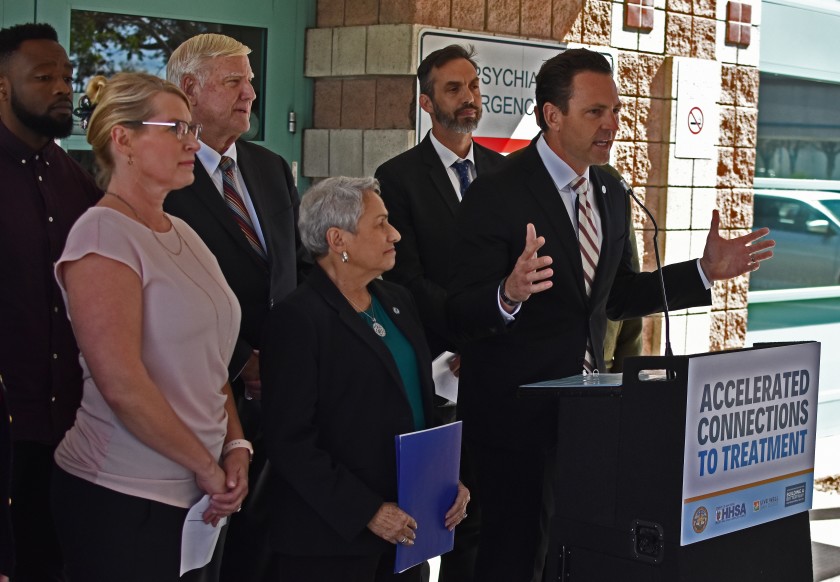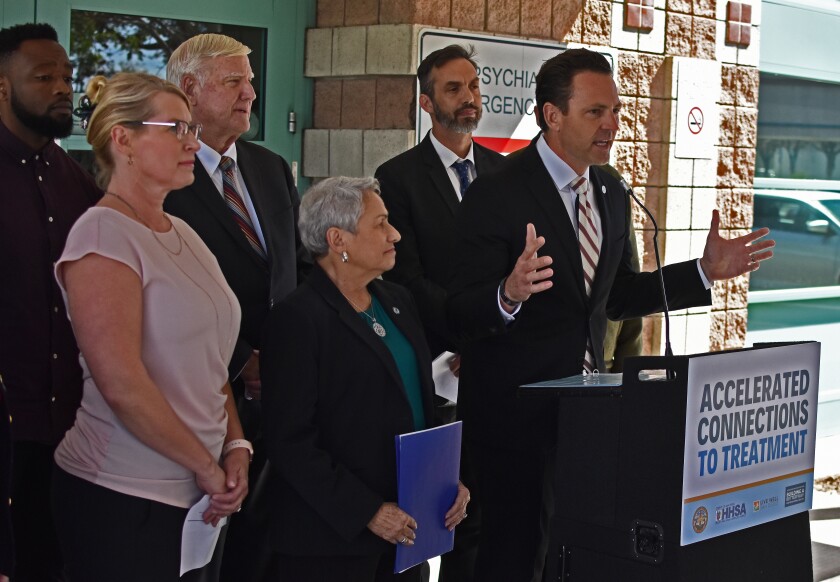County announces high-intensity drug rehab program for frequent psych patients


Effort will focus on group of about 500 people who are regular visitors to the county’s psychiatric hospital
About 500 people with drug and alcohol dependencies who frequently check into the county’s psychiatric hospital on Rosecrans Street will be the first group to receive new care coordination services that the county hopes will eventually revolutionize mental health care throughout the region.
At a news conference Wednesday, county supervisors Greg Cox and Nathan Fletcher announced what they’re calling the “Accelerated Connections to Treatment” program, saying that it is intended to break the cycle of readmission for a relatively small group of residents who often have co-ocurring mental health needs and substance abuse disorders.
For too long, the two supervisors said, the county’s psychiatric hospital has been detached from the world of substance abuse treatment.
“Too often, people struggling with substance abuse are dropped off or sent to the county psychiatric hospital,” Cox said. “After 24 hours, when they are stable, they’re released back into the community only to struggle again and fall back into the same traps.”
Under the new model announced Wednesday, withdrawal would begin at the hospital under American Society of Addiction Medicine guidelines. Each client would be assigned an “addiction specialist” with lived experience conquering the same drug use demon.
That specialist, though, would not be confined to the county hospital but will be empowered to stick with their clients after they’re discharged, even helping them physically make it to the next step.
“The addiction specialist will not just give them a pamphlet and an address to go to; they will drive the patients to drug medical outpatient and residential services and continue to support them afterwards,” Fletcher said.
Dr. Luke Bergmann, director of behavioral health services for the county, said that the group of roughly 500 people who will receive intense focus of these efforts starting in May are among the psychiatric hospital’s most intense users. On average, he said, each is hospitalized three times per year.
Methamphetamine is the most common drug that leads to hospitalization. Meth can often cause bizzare behavior that, even to trained mental health workers, can look a lot like the symptoms of a mental illness. The new model, Bergmann said, is designed to provide enough breathing room for specialists to untangle the bigger picture, which is the only way to make lasting progress.
“It gives us more time to really work with the entire person so that we can discern what part is substance use disorder and what part of this may be something else,” Bergmann said.
For now, the effort is confined to those who qualify for Medi-Cal, the state’s health insurance plan of last resort. The county recently tripled its funding for drug treatment of Medi-Cal patients, allocating $179 million in state funds to bolster the number of programs available in the community. Fletcher and Cox have worked with the City of San Diego to create a special fund that could help these programs transform buildings that could provide additional space for residential treatment.
Those programs, Fletcher said, will be crucial in making sure that the investments in getting Medi-Cal patients off drugs and into mental health treatment programs don’t end with successful cases ending up back on the streets due to a lack of affordable housing. Though local cities, the county, and many nonprofits are still in the throes of identifying more housing for people in such situations, and the problem is far from solved, Fletcher said that no one should forget that many people are homeless due to untreated mental illnesses.
“A lot of them have family members that are willing to take them in, they have friends that are willing to take them in, but we have to get them in a stable state of mind, and in a stable framework, and have an ongoing treatment program that is working for them,"Fletcher said.
The accelerated connections program is the first concrete example of a new philosophy taking hold at the county that seeks to shift from the current crisis model of care, which often results in involuntary hospitalization by law enforcement, to a more preventive mode. The first 500 patients identified to be the first to participate in this new mode of operation are, in some ways, serving as a test case, a proof of concept, of the larger plan to rely on care coordination countywide. No financial details of the plan were shared Wednesday, though Bergmann said he expects the increased costs created by hiring more addiction specialists to be offset by a reduction in hospitalization costs.
 Pathways Drug Rehabilitation Luxury Addiction Treatment & Detox Center
Pathways Drug Rehabilitation Luxury Addiction Treatment & Detox Center


